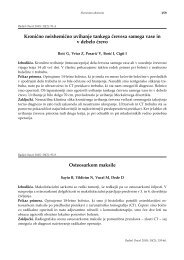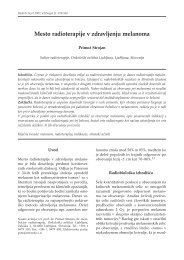You also want an ePaper? Increase the reach of your titles
YUMPU automatically turns print PDFs into web optimized ePapers that Google loves.
Development <strong>of</strong> novel magnetic nanoparticles based drug delivery<br />
systems for cancer treatment<br />
Georgy Mikhaylov1, U. Mikač2, Ana Sepe2, Igor Serša2, Vito Turk1, Boris Turk1, Olga<br />
Vasiljeva1<br />
1Dept. <strong>of</strong> Biochemistry and Molecular and Structural Biology, Jožef Stefan Institute, Ljubljana, Slovenia;<br />
2Dept. <strong>of</strong> Condensed Matter Physics, Jožef Stefan Institute, Ljubljana, Slovenia<br />
The development <strong>of</strong> new effective drug delivery systems for the treatment <strong>of</strong> cancer is<br />
one <strong>of</strong> the top priority trends in the biomedical technology <strong>of</strong> the last decade. Among<br />
the different methods <strong>of</strong> drug delivery, magnetic drug targeting could be a promising<br />
approach by possibility <strong>of</strong> specific delivery <strong>of</strong> chemotherapeutic agents using magnetic<br />
nanoparticles and an external magnetic field which is focused on the tumor. Recently,<br />
magnetic nanoparticles have attracted additional attention because <strong>of</strong> their potential as<br />
contrast agents for magnetic resonance imaging and heat mediators for cancer therapy.<br />
Currently there are two approaches for the use <strong>of</strong> magnetic nanoparticles in targeted drug<br />
delivery: (i) chemotherapeutic agent is coupled directly to the nanoparticles or, (ii) both<br />
the drug and the magnetic nanoparticles are encapsulated into the lipid vesicle, forming<br />
magnetoliposomes. The considerable potential advantages <strong>of</strong> liposome encapsulation are<br />
the prevention <strong>of</strong> local dilution <strong>of</strong> the drugs or contrast agents and limitation <strong>of</strong> their<br />
interactions with biological media into which they are administered.<br />
Recently the major progress has been made in our current understanding <strong>of</strong> the role <strong>of</strong><br />
lysosomal cysteine proteases (i.e. cathepsins) in several pathological states, such as cancer.<br />
There is increasing evidence that cysteine cathepsins contribute to the proteolytic events<br />
during tumour progression and metastasis. Thus, in our study we aim to examine the<br />
efficiency <strong>of</strong> cathepsin inhibitor therapy using magnetoliposomes based delivery system<br />
in a transgenic mouse breast cancer model.<br />
p29111
















